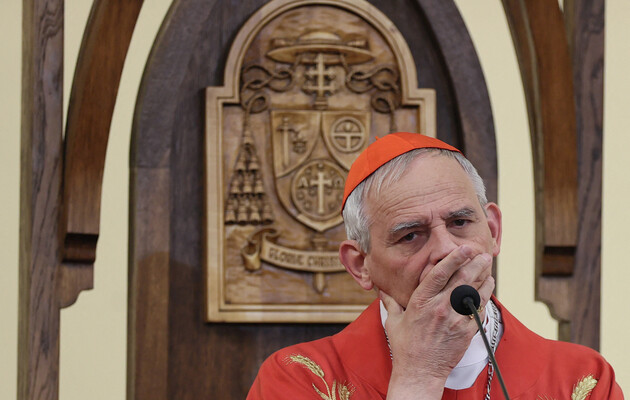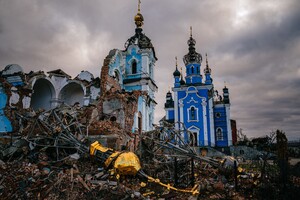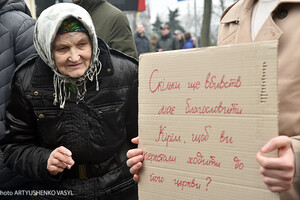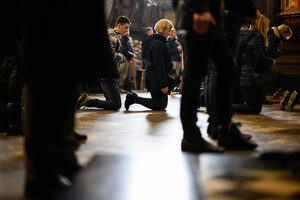The Pope is Becoming More Modest

After Cardinal Matteo Zuppi’s visit to Moscow, the tone of Vatican statements became more reserved and pessimistic. Pope Francis accidentally shared that “there is no end in sight to the war,” and Cardinal Zuppi, his representative in Russian-Ukrainian affairs, said that there is no “peace plan” in the Vatican – and there never was.
It is hard to believe that there was no plan because the Pope himself mentioned it. But there is not the slightest doubt that after Zuppi’s visits to Kyiv and Moscow, the “Pope’s plan” is destroyed.
Bad omens
Cardinal Zuppi is not lucky. Whenever he comes to the so-called Eastern Front, he appears at the most inopportune moment – when everyone seems to not care a lot about him. Not that the war was full of “appropriate moments.” Even in the military routine there are especially rough patches.
The visit of the papal envoy to Kyiv coincided with the blowing up of the Kakhovka HPP dam. And everyone was much more interested in the water level than the so-called peace plan of the Vatican. Cardinal Zuppi’s visit to Moscow coincided with the murderous shelling of Kramatorsk. We again, to put it mildly, did not care much about the papal envoy.
Someone superstitious would say that “there are no coincidences.” But in the second year of the war, we already know by heart: a man-eater does not need a reason to devour someone.
Did Cardinal Zuppi understand this? Probably yes. At least what he heard in both capitals (and that’s what he traveled for – to “hear” something) made him brush off questions about the Vatican’s “peace plan” almost in exasperation. There are no plans. All that can be done is to try to save at least one of the “weakest and most vulnerable.”
Pope Francis fully agrees with his envoy. He once again called on the congregation to pray for Ukraine since nothing is impossible for God. But the Pope, obviously, does not value his own human capabilities as highly as before.
Humanitarian track
Cardinal Zuppi “keeps his face” as hard as he can: he characterizes his visit to Moscow positively, and he even calls the meeting with Patriarch Kirill a “productive” one. The press affiliated with the Vatican is trying to explain to readers why the visit of the papal envoy cannot be considered a “failure.” But the very fact that this word – “failure” – flashes before readers’ eyes time and time again (especially in the headlines), creates the impression that the authors are trying to convince and reassure themselves.
I mean, think about it. During the three-day visit, the papal envoy had three meetings: with President Putin’s assistant Yurii Ushakov, Patriarch of Moscow Kirill and Commissioner for Children's Rights Maria Lvova-Belova. Ushakov is considered an “influential person” in presidential circles, and the papal envoy should be comforted by this. However, he was warned that no one was waiting for him in Moscow.
In fact, through Yurii Ushakov, Cardinal Zuppi – and through him the Pope – were made to understand that they in Russia did not need their political and peacemaking participation. All the Vatican is allowed to interfere with are humanitarian missions. And under one strictest condition – no politics at all.
Actually, there were not three, but four meetings: Ushakov met Zuppi once more before the cardinal’s departure from Moscow. He met, in his own words, precisely in order to remind once again: negotiations between Moscow and the Vatican are possible only within the framework of the “humanitarian track.”
There is only one problem: if we do not enter the “political field” and talk only about the victims but in no case about those who caused their suffering the Vatican turns from a peace negotiator into a negotiator about the fate of hostages. That is, these are no longer negotiations between the parties to the conflict. This is an attempt to encroach on the terrorists several human lives.
The photo, in which Cardinal Zuppi shakes the hand of the children’s ombudsman of the Russian Federation, Maria Lvova-Belova, who is wanted internationally for jointly committing the abduction of Ukrainian children, caused a wave of completely justified disgust on the part of Ukrainians. Still, this was also a moment of absolute clarity: on the “humanitarian track” the Russians will trade the lives and fates of Ukrainian hostages. In particular, children. The fact that the Vatican is willing to participate in these negotiations is probably good news, as far as the adjective “good” can be applied to this situation. It remains only to find out what the conditions of possible agreements are.
To the cardinal’s credit, it must be said that this kind of agreement does not excite him. At least, when commenting on his visit to Moscow, he uttered the words “deportation of Ukrainian children.” Calling a spade a spade – especially when it comes to war crimes – is a luxury diplomats can rarely afford.
Meeting of The Two Romes
Patriarch Kirill did find time for a short meeting with the Vatican envoy. Until the last moment, its probability was doubted. However, I am afraid, apart from the very fact of the meeting of representatives of the two Romes (which are eternally competing), there is nothing to discuss: according to the official communique, Patriarch Kirill and Cardinal Zuppi discussed so-called humanitarian steps for “a peaceful resolution of the conflict in Ukraine.”
As it became clear during the meeting, the requirement to stay within the limits of the “humanitarian track” does not apply to Patriarch Kirill: he loaded the envoy with a full set of usual Moscow clichés prepared especially for the Vatican and Pope Francis personally, namely about “the confrontation between Russia and the West,” as well as about the threat of a global war, which must be averted by the united Christian world.
However, there were still some interesting details in this meeting.
First, at the meeting with Patriarch Kirill, Cardinal Zuppi was accompanied by the Vice President of the Community of Sant’Egidio, Adriano Roccucci. Cardinal Matteo Zuppi has long been closely associated with this organization, which is called the “parallel diplomatic institution” of the Vatican. The community is engaged in charity all over the world, including in Ukraine. And in this role, it has enormous weight, which it turns into political capital if necessary. Pope Francis highly appreciates the organization’s peacemaking capacity. The choice of Cardinal Zuppi as the main negotiator for Ukraine is connected with the success that the cardinal, together with the Community of Sant’Egidio, achieved in ending the war in Mozambique.
What does this mean for Ukraine? In contrast to the “official” diplomats of the Vatican, where there are both Russophiles and supporters of Ukraine, the leaders of the Community of Sant’Egidio are supporters of the policy of pleasing Moscow. It is enough to recall how on February 25, 2022, under the decent pretext of “stopping the suffering of the civilian population,” the head of the Community, Andrea Riccardi, published a statement calling for the actual surrender of Kyiv: “lay down your arms” and “declare Kyiv an open city.” This evasive wording (what does “open city” mean?) enabled the authors of the appeal to later deny that they actually meant the surrender of the capital.
Rhetoric in the style of “pleasing a cannibal” suspiciously coincides with the rhetoric of Pope Francis and the wishes of the Kremlin.
Secondly, Patriarch Kirill literally complained to the papal envoy about his personal drama: he wants peace more than anything in the world, because “his congregation in Russia and Ukraine is divided by war.” What do they say in the Ukrainian Orthodox Church, it is “no longer under Moscow Patriarchate”? It seems that they forgot to inform their patriarch about this. And he worries about them, poor thing...
About modesty
On the days of Cardinal Zuppi’s visit to Moscow, there was no single text in the press affiliated to the Vatican that did not mention “Prigozhin’s rebellion.” Zuppi’s mission, according to the public, had a so-called special meaning during an unprecedented “test for Putin.”
Unfortunately, in none of these texts did I find a single word about the fact that Zuppi’s visit took place during the tragedy in Kramatorsk – the papal envoy arrived in Moscow the day after a rocket attack on a cafe full of people, and the “background” of the visit was the clearing of rubble, updating information about the dead, funerals, and concern for the wounded.
The conclusion is simple: “a test for Putin” from the point of view of the press affiliated to the Vatican (and I’m afraid, not only the press), is more important than his next crime. One can be offended, although it is pointless. One can try to reach out to those who, as best they can, save their own islands of comfort in the midst of the chaos in which the once familiar world order is sinking.
The Vatican, too, is clinging to its own island of a fading world where everything was relatively clear: empires and oppressed peoples, poles of economic attraction and orbits of geopolitical influence.
Zuppi’s mission, I would like to believe, stroke to this picture a rather tangible blow, if not a devastating one. It is difficult to say unequivocally what upset Pope Francis – Moscow’s arrogance or Kyiv’s stubborn unwillingness to lay down its arms. But this is no longer of particular importance as his so-called peace plan is worthless. And the Pope has the courage to admit it.
Therefore, despite everything, I agree with the Vatican press: Zuppi’s mission in Moscow did not “fail.” If the position of Pope Francis has changed from “make peace with everyone immediately” to “save those you can,” in my opinion, this is a success. Not the kind of a success that Pope Francis could count on. But the Vatican was able to adjust its policy and did so. It became politically more modest. If it’s track, let it be a track. If the Holy See manages to save at least a few dozen hostages without leaving the slippery “humanitarian track,” it will be a real victory. It is much more important than talking about peace and absurd performances about the “common grief of the Ukrainian and Russian people”.
Please select it with the mouse and press Ctrl+Enter or Submit a bug














 Login with Google
Login with Google